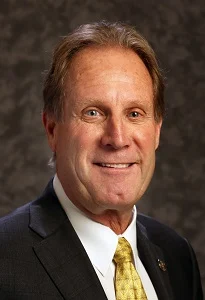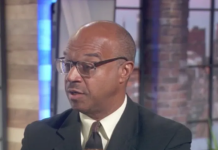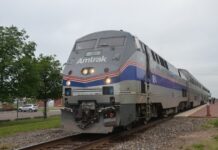Leading lawmakers on Wednesday bristled at the idea of moving away from a fuel tax to fund roads to a tax based on how far Kansans drive.
The chairs of the House Appropriations Committee and Senate Ways and Means Committee cast doubt about a road-usage charge in response to a briefing they received from the state Transportation Department, which has been studying the topic.
Transportation Secretary Calvin Reed on Wednesday updated the Legislative Budget Committee on the study, which stemmed from a 2019 report compiled by a task force made up of lawmakers and representatives of the transportation industry.
The 2019 report recommended investigating funding alternatives, including a fee based on vehicle miles traveled to help address the increasing fuel efficiency of cars and trucks coupled with the rise of electric vehicles.
The results of the study, underway since 2021, will be presented to the Kansas Legislature next year.
“This study was really to understand people’s attitudes, what would it look like, how would people perceive it if we moved to something like a” road-usage charge, Reed told the committee on Wednesday.
Nevertheless, lawmakers expressed reservations about moving to a different way of raising money to pay for maintaining the state’s road network.
“The mileage deal – I don’t think there’s anyone out there that I’ve talked to that thinks that’s even close to fair,” said Republican state Sen. Rick Billinger, chair of the Senate Ways and Means Committee.

Billinger said he didn’t think the road-usage charge would be fair for the state’s agriculture industry, which has to travel long distances to move crops.
“When you start talking mileage…to me it’s not a fair charge of agriculture,” he said. “That’s something that is not popular at all out there.”
Rep. Troy Waymaster, chair of the House Appropriations Committee, shared a similar view.
“I don’t particularly like that approach,” Waymaster said of the road-use tax.
“In the farming industry, you drive a lot of miles,” Waymaster said. “I don’t think that is the right approach in trying to supplement the loss in the motor fuels tax.”
Increases in vehicle fuel efficiency and wider use of electric vehicles raise questions about the long-term viability of fuel taxes as a means of funding transportation.
States across the country are studying new ways to tax the public for transportation as gas taxes become less sustainable with more fuel-efficient and electric vehicles on the road.
At least 10 states have passed legislation to study what’s known as a road-usage charge.

The Kansas study involved more than 500 people, including 324 rural participants and 242 urban and suburban participants.
Reed said the study asked participants to try out different technologies in their vehicle for collecting a road-usage charge and share their perceptions.
They were asked if it infringed on their privacy and if it was a fair way to collect the tax. The state didn’t collect any personal information from the participants.
Reed said the study focused heavily on the agricultural sector. Reed told Billinger that transportation planners heard some of the same concerns the senator articulated.
At the outset of the road-usage study back in 2021, state gas taxes made up about 21% of the revenues that pay for Kansas roads, with sale taxes comprising the largest part of the revenue pie at 38%.
By 2045, transportation planners said at that time they expected state gas taxes to contribute to 11% of highway revenues, with 60% coming from sales taxes.
Waymaster said a better option for preserving highway funding might be increasing the fee for electric vehicles, which is $100 annually for full electric vehicles and $50 per year for hybrid electric vehicles.
“We’re pretty low compared to other states,” Waymaster said. “Even in the Midwest region we’re pretty low.
“We’re only going to see electric vehicles increase in production and sales, so maybe that’s an avenue we can possibly look at,” he said.
The federal gas tax, set on a per-gallon basis, hasn’t been raised since 1993, and the revenue it generates is insufficient to support the transportation programs authorized by Congress since 2008, the Congressional Research Service reported in 2016.
The Kansas gas tax is 24 cents a gallon, and it was last raised in 2003.
In the last decade, a number of states started experimenting with collecting revenue directly from drivers based on their travel with the idea that motorists should pay based more on how much they travel than the fuel they buy.
The University of Iowa’s Public Policy Center studied a mileage-based user charge a decade ago in which on-board computers with global positioning systems were installed in the vehicles to record mileage.
The study involved 2,650 volunteer drivers in 12 locations throughout the country, each driving an average of 9,000 miles during the two-year study that ended in 2010.
The Iowa study, the first to examine road user charges on a national and multijurisdictional scale, found that 92.5% of all driven miles were successfully measured by both the GPS and the onboard diagnostics system.
Throughout the study, participants were given a series of questionnaires to evaluate how accepting they were of the move away from a fuel tax and the tradeoff between privacy and billing statements.
At the start of the study, 41% of the volunteer drivers were somewhat or very positive about the idea of replacing the gas tax with a tax based on vehicle miles driven.
By the end of the study, 70% had a positive view of shifting to a road-user charge.
Seven years ago, a study done in California found 73% believed that taxing by the mile was more equitable than a gas tax.
Further, the study found that 87% of participants found the pilot to be easy and 85% were overall satisfied with the pilot, and 91% expressed willingness to participate in another road charge pilot.
Seven years ago, Colorado concluded a study of road-usage charges involving about 150 volunteer participants.
The study, which examined three different mileage reporting options, found that about a quarter of the participants thought it would either interfere with their privacy or penalize drivers who buy fuel-efficient vehicles.
About 62% of the Colorado study participants thought the road-usage charge would not properly track mileage from anyone outside the state who use state highways.
About 44% agreed that a road-user charge would affect all people in equally.
Others who thought it would not affect all drivers thought rural residents would be disproportionally affected.
Minnesota also examined road-user charges with about 500 participants who used specialized Android smartphones with a preinstalled mileage fee application specifically designed for the pilot.
The smartphones had to be in the vehicle, and they communicated with a device plugged into the on-board diagnostic port to verify the phone was in the correct vehicle.
The phones used GPS to determine location and mileage and transmitted study information through the cellular network.
Researchers reported that drivers didn’t express fear about a lack of privacy because they already thought that they gave up their privacy to mobile phone service providers.
“Instead, participants worried that their data would be vulnerable to access by wrongdoers who would seek to misuse the information,” the study said.
“They wanted reassurance that their data could be safely held by the state, such as in the form of a security certificate program.”
Oregon implemented the country’s first road-user charge system that is available on a voluntary basis in which drivers pay 1.8 cents per mile traveled.
Oregon uses odometer readings with a plug-in device to collect the tax.
Drivers can choose between a device with no GPS that tallies charges for all miles driven or a device with GPS that tallies only miles within the state.
Each vehicle’s mileage is sent to an account manager, who then bills the drivers.
















